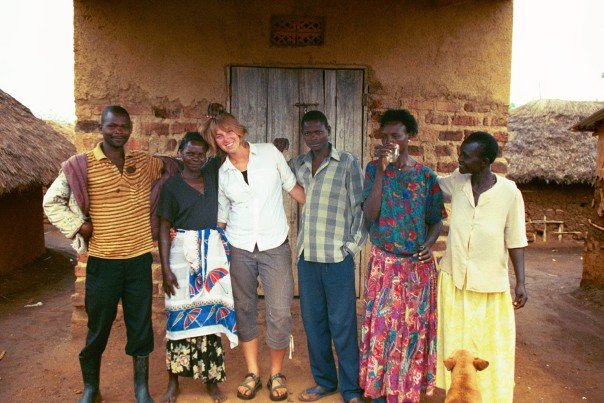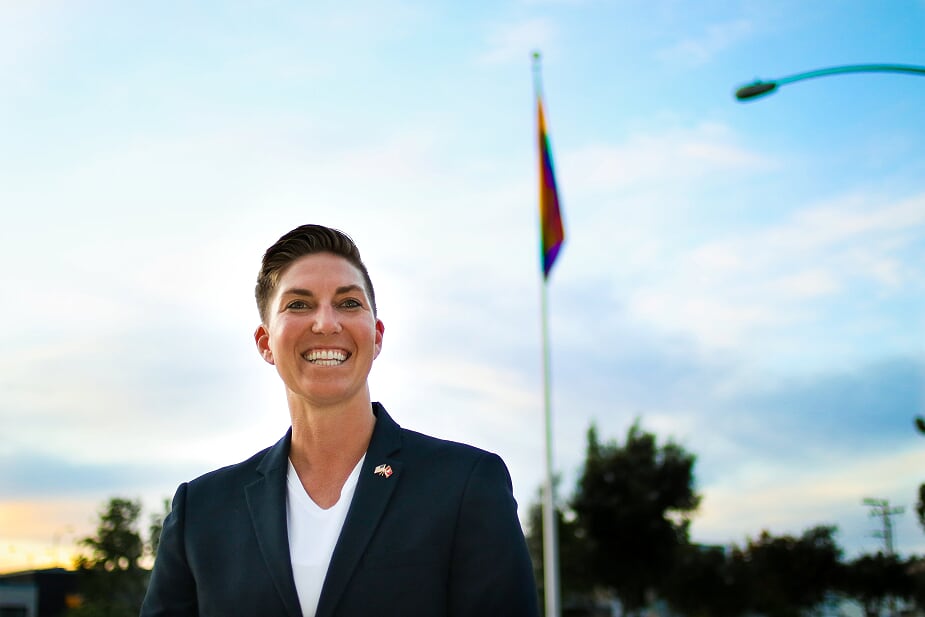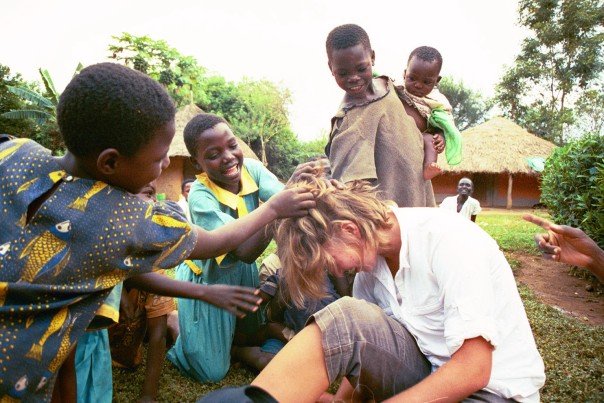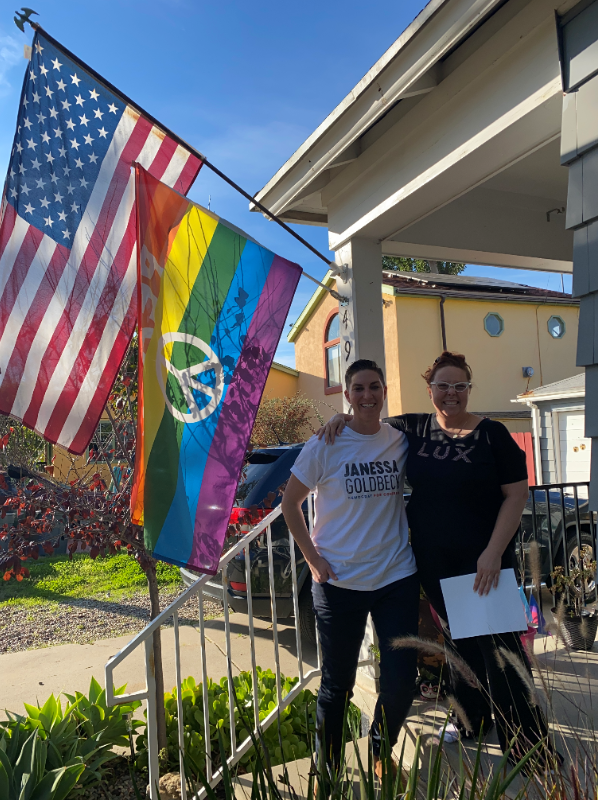SIT Uganda alumna running for Congress
After studying in Africa, "I came back to the U.S. all fired up"
January 16th, 2020 | Africa, School for International Training, SIT, SIT Study Abroad

Janessa Goldbeck, LGBTQ ex-Marine captain and a first-time U.S. Democratic candidate in one of the most hotly contested congressional elections of 2020, says her time studying abroad with SIT's Uganda: Global Development Studies showed her how to face enormous challenges – and overcome them.
The experience, she says, changed her life and set her on a career path that took her straight to Washington, even before she graduated from university. "My time in Uganda taught me how we can all have a role not just in changing the country, but in changing the world," says the 34-year-old. "I came back to the U.S. all fired up."
In 2005, when Goldbeck went to Africa, she had never studied abroad before. "I had been backpacking in Europe but this was completely different," she says. "SIT had us doing some fieldwork in western Uganda. We were dropped off in pairs in a remote village where many of the kids had never seen a white person before, and told to help plan to build a well."
My time in Uganda taught me how we can all have a role not just in changing the country, but in changing the world.
The undertaking proved extremely difficult. "We went in with solutions instead of asking questions and really hearing what these communities needed," she says. "I learned the best way to get something done was to actually listen and then work to amplify people's voices. That lesson really stuck with me.”
An excursion to a neighboring country led by SIT also led to a pivotal moment. “In Rwanda, we visited a genocide memorial, and that's where I heard about what was happening in Darfur," Goldbeck says. "It was a huge memorial, with the words ‘never again’ painted on the wall, but in Sudan, not far away, atrocities were still happening.”
After returning to the U.S., Goldbeck, while still a student at Northwestern University, began traveling to Washington to lobby against war crimes in Darfur as a human-rights activist. "My time in Uganda taught me that the U.S. could have a role in stopping genocide,” she says.
It was the first time I saw people who lived in fear, and I saw how important it was to stand up for LGBTQ rights.
Her time in Africa also opened her eyes to the perils overseas of being LGBTQ. "When I was over there, I wasn't out yet," she says. "I didn't feel a lot of pressure in the U.S., but in Uganda, it was illegal to be LGBTQ. One of the other students in our program was gender-fluid, so we found a safe place, a coffeehouse, to go to. It was the first time I saw people who lived in fear, and I saw how important it was to stand up for LGBTQ rights."

Following graduation, and for the next several years, Goldbeck directed high-level advocacy and media campaigns focused on the prevention of mass atrocities in Sudan, the Democratic Republic of Congo, and Myanmar – much of it inspired by her experiences with SIT. She also worked to mobilize U.S. citizens to pass state and federal legislation to fund peacekeeping efforts, enforce sanctions, and protect civilians around the world.
"What SIT's sustainable development program taught me was so key. I learned that there are good and bad ways to offer aid and create programs that might help people, but unequivocally, we can say that investing in our allies and partners, even in unstable nations, is one of the best ways we can offer global change."
Goldbeck notes that while a lot of Americans believe the U.S. spends exorbitantly on foreign aid, "it’s actually less than 1 percent of our entire national budget," she says. "It’s an investment in our partners and allies to make sure they have options, that instead of turning into extremist groups, they can have a better life, attend schools, have health care, learn how to turn sunlight into energy, safeguard their water and sanitation – all of those are in the interests of America and our allies."
In 2012, she was named to the "99 under 33" a project of Diplomatic Courier magazine, which ranked the 99 most influential foreign policy leaders under age 33. That year, Goldbeck took a 4,200-mile solo cross-country bicycle ride across the U.S., meeting with elected officials, civic leaders, nonprofits, and members of the media to focus national attention on how international development keeps America safe.
What SIT's sustainable development program taught me was so key. I learned that there are good and bad ways to offer aid and create programs that might help people ...
In 2012, the Encinitas, Calif., native also went to Officer Candidates School in Quantico, VA, joining the U.S. Marine Corps. During her time in training, she participated in a government study that allowed women to volunteer for combat courses, ending the repeal of the Combat Exclusion Policy and leading to the integration of women in military combat, which opened up all jobs to military women.
Goldbeck served in the United States, Norway, and Romania. In 2016, she was promoted to the rank of captain and also served as a Uniform Victim Advocate, representing service members who had experienced sexual assault. As President Donald Trump was elected to office, she watched his inauguration from a chow hall in Romania with American allies, where she worked to support NATO operations, engaging in live fire training exercises. "Our relationships abroad are so important," she says. "These are my brothers and my sisters.” Before leaving active duty in fall 2019 to run for Congress, she was awarded the Navy and Marine Corps Achievement Medal.

These are exciting times for Goldbeck as she runs for a congressional seat in the 53rd district in California, which includes eastern San Diego and the eastern suburbs, where she recently bought her first home. Goldbeck says she is the product of America's progressive policies: “My mom was a public school teacher my dad drove a tow truck. My time with SIT in Africa was funded by Northwestern’s private grants program, an endowment. I bought my home with a VA loan [a mortgage backed by the U.S. Department of Veterans Affairs]. All of these things are the direct result of progressive policies that allow people access to upward mobility. And they have given me the ability to make my life."
I think when you serve in the military, which is a working-class institution, you see so many people join the Marine Corps to better their prospects, to own a home, go to college and have health care.
If elected, Goldbeck says she plans to continue to fight to improve Americans' lives. "I think when you serve in the military, which is a working-class institution, you see so many people join the Marine Corps to better their prospects, to own a home, go to college and have health care," she says. "These are things that are really universal for people across the county."
She also believes in fighting climate change. “I learned on the Hill that veterans are very effective messengers on the environment and public lands are very popular across partisan lines. It taught me that you always can do things to move the needle, even when you’re dealing with forces opposed to conservation or tackling the climate crisis.”
Goldbeck is running against more than a dozen other candidates in California, including Sara Jacobs, the granddaughter of Qualcomm billionaire Irwin Jacobs, a deep-pocketed Democrat who has spent millions on elections. But with a recent endorsement from VoteVets, a political action committee representing U.S. veterans, and a splashy article in BuzzFeed News just after announcing her candidacy, Goldbeck has already shown she can stand out in a crowded field.
"I was an openly gay progressive woman in one of the most conservative organizations in America and I was still able to be effective and successful and liked by my peers," she says. "I also think that as a Marine Corps officer leading sometimes hundreds of people under her charge is invaluable experience for anyone running an effective office on the Hill. I know how to pass bills and I think it's important to have more veterans in Congress." Only seven women veterans now serve in Congress.
Even so, Goldbeck knows the rush to fill the congressional seat vacated by California Democrat Susan Davis -- who announced in 2018 that she would not be seeking re-election, will not be easy. After Davis's nearly 30 years in office, her abrupt departure has triggered a free-for-all in the lead-up to the March primary. Goldbeck says she recently had the opportunity to speak with Davis and received some advice that echoed the lessons she had learned at SIT. "My congresswoman told me the most important job for a member of Congress is to listen and to be present, and to allow people’s voices to be heard," she says.

